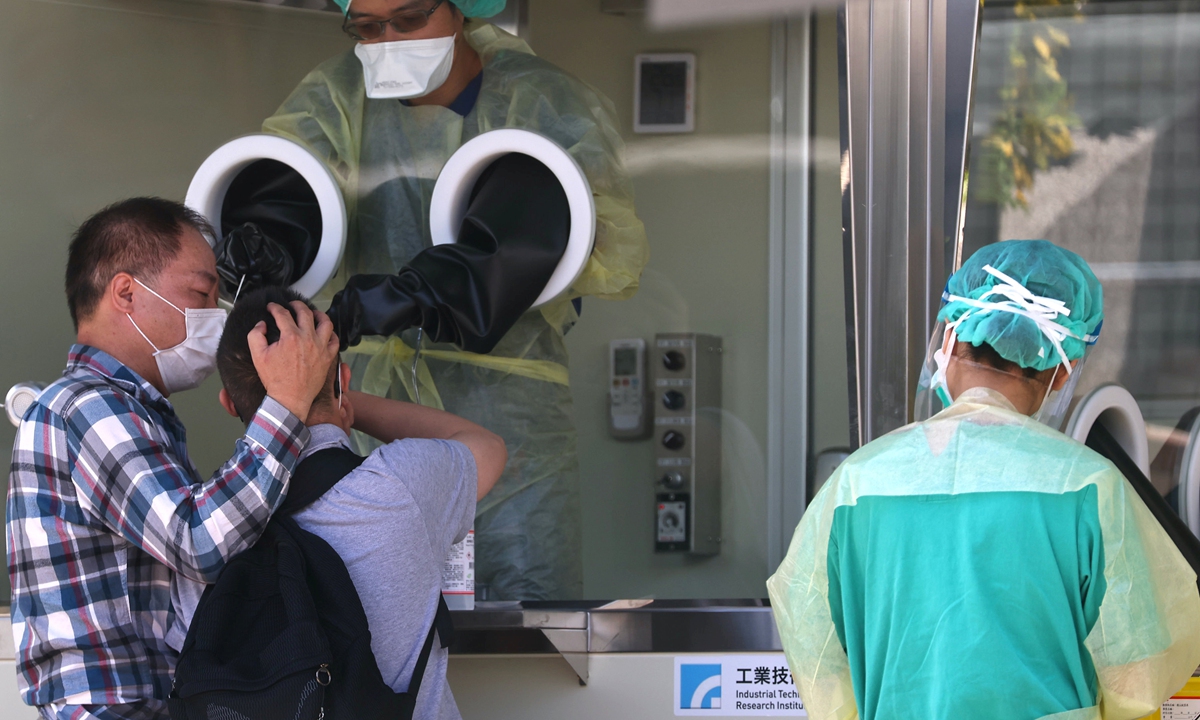
Residents of the island of Taiwan take rapid test for COVID-19 on Tuesday. The island reported 281 new locally transmitted COVID-19 cases and six deaths, bringing the death toll to 35, on Tuesday and local authorities decided to extend Level 3 Alert until June 14. Photo: IC
"Coming to the mainland to get vaccinated against COVID-19" has become a major consideration for many Taiwan residents given the grave epidemic situation and shortage of vaccines there, said Yok Mu-ming, former president of the pro-unification New Party of Taiwan. Yok told the Global Times in an exclusive interview on Sunday that he was impressed by the strict quarantine and anti-epidemic measures in the mainland while staying at a hotel in quarantine after coming to Shanghai to take the jab.
Mainland cities including Beijing, Shanghai and Shenzhen in South China's Guangdong Province have started to administer vaccine doses to Taiwan compatriots living in the mainland for free, and those whom Global Times talked to said that there have been no adverse effects, and that they went through the exact same process as local residents in the mainland.
Yok earlier announced through a video that he was about to depart from the island to Shanghai to get vaccinated. Starting from April 19, the municipal government in Shanghai included local Taiwan compatriots aged 18 to 75 who live in Shanghai into the scope of those eligible for the Chinese-made vaccine jabs. The former president of the New Party of Taiwan told the Global Times that when the Taiwan residents most need help from the mainland, the Democratic Progressive Party (DPP) authorities still focus on ideological battles, using the epidemic to serve its political goals and seek "secession."
"I would rather go through the quarantine process to get vaccinated in the mainland, and I don't waste time anymore," he said, noting that he came to the mainland with his wife, and underwent quarantine in different rooms.
When he arrived at Shanghai, he also experienced strict but reassuring arrival anti-epidemic tests, Yok noted. "Before departure, I took the nucleic acid test, which was negative. When I arrived, I took the tests again with both nasal and throat samples," he said.
"I think they did the tests more carefully here in the mainland," Yok said, noting that the swab tests were also taken deeper as he felt he was about to throw up.
Also, it was a long and rigorous procedure from the airport to the hotel where he is undergoing quarantine, but everything was done in an orderly way. For example, professional staff in protective suits guided him to the room, and there were staff accompanying during the whole process, he told the Global Times.
Yok also urged Taiwan residents who are able to come to the mainland to get vaccinated here, as he knows many of them are very interested in this plan.
The island reported 493 new cases of COVID-19 on Saturday, including 486 domestic infections and seven imported ones, in addition to 21 deaths, according to local media reports. The DPP authority has been widely criticized by experts for rejecting mainland vaccines and ignoring officials' calls to purchase those via local retailers, as the island faces a vaccine shortage.
Cheng Po-yu, executive director of the cross-Straits Youth Exchange Association who recently took the vaccine in Beijing, told the Global Times there were no adverse effects, Taiwan residents are treated the same as others, and the process is very fast.
"The information for Taiwan residents vaccinated in Beijing could be accessed on the e-health certificate on smartphone, which can be updated simultaneously," he suggested.




